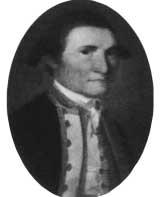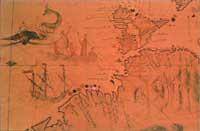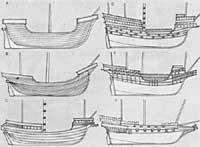James Cook
1994/05/01 Azkune Mendia, Iñaki - Elhuyar Fundazioa Iturria: Elhuyar aldizkaria
1 Born in England on 28 February 728 in Marton (Cleveland) in Yorkshire, he is known for discovering new territories by navigating mostly the Oceans. However, the contribution to science in the field of dietary cartography and astronomical observations was not small, so we consider it interesting to report here.
James Cook was the son of poor peasants and very young he started working in a shop. Then they learned the trade with some builders and thanks to their merits they became counter-masters sailing in cabotages. For eight years he dedicated himself to commercial vessels in the North Sea, until in 1755 he entered the Navy. In 1759 he obtained the degree of captain and J. He participated in the expedition against Québec de Wolfe.
Trips to distant seas were to better understand the geographical character of the Oceans and Earth. Since 1760 he spent several years exploring Labrador and the coast of Newfoundland. On August 5, 1766, he analyzed the solar eclipse from Cape Ray of Newfoundland.

In 1768, under the auspices of the Royal Society and by order of the Admiralty, he led the expedition to the South Pacific. Endeavour went to see how Venus passed by the Sun. From the island of Tahiti they studied the two stars mentioned. Later he declared conquered for his king the island and the archipelago, which he called Societies in honor of the Royal Society.
He also toured New Zealand by mapping islands. He saw the coast of south-eastern Australia (April 19, 1770). It appropriated the size of that continent which had not yet been explored by the Europeans around the eastern coast and declared it as the territory of its king on August 23, 1770. He returned from the Strait of Good Hope to Great Britain in 1771, but in 1772 (13 July) he undertook another great expedition with two ships. He went to the southern seas and, on the margin of Australia, proved that even the Antarctic Circle there were no other large continents. Therefore, except the poles, all the Earth's seas were discovered.
On this second expedition to the Pacific, Cook was able to test theories about Lind's dietetics. For example, he had no scurvy problems causing the sailors to eat lemon. That is why the Royal Society gave him the medal. He left for the Pacific (his third major expedition) on July 12, 1776, with the ships Resolution and Discovery. He sailed the Pacific from north to south and his goal was to find some passage from the Pacific to the Atlantic Ocean, but of course they failed.
In 1778 he discovered the Sandwich Islands in Hawaii and from there he left for the North American coast. Bering returned to Hawaii due to sea ice. Food was taken from its inhabitants and tensions arose. Coo himself killed a Hawaiian and Cook, stabbed, was killed on February 14, 1779 in Kealakekua Bay.

Gai honi buruzko eduki gehiago
Elhuyarrek garatutako teknologia





